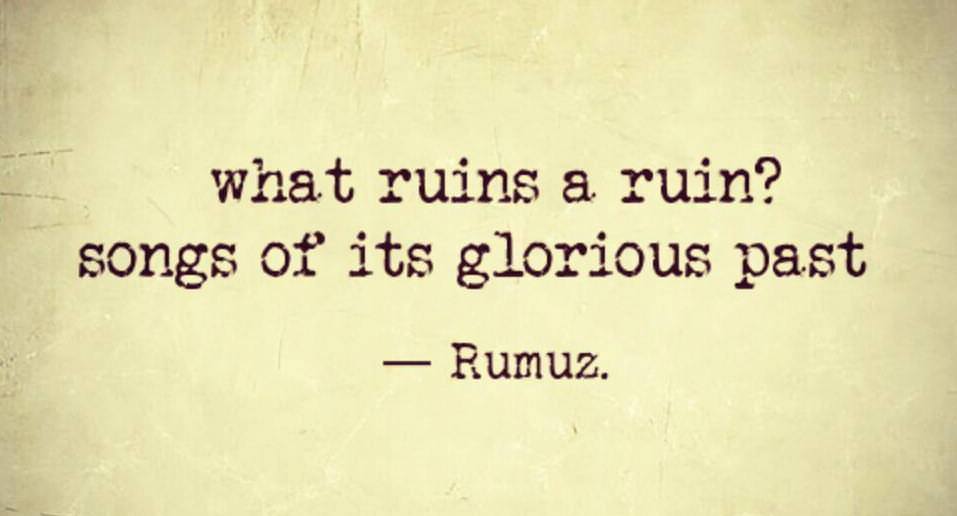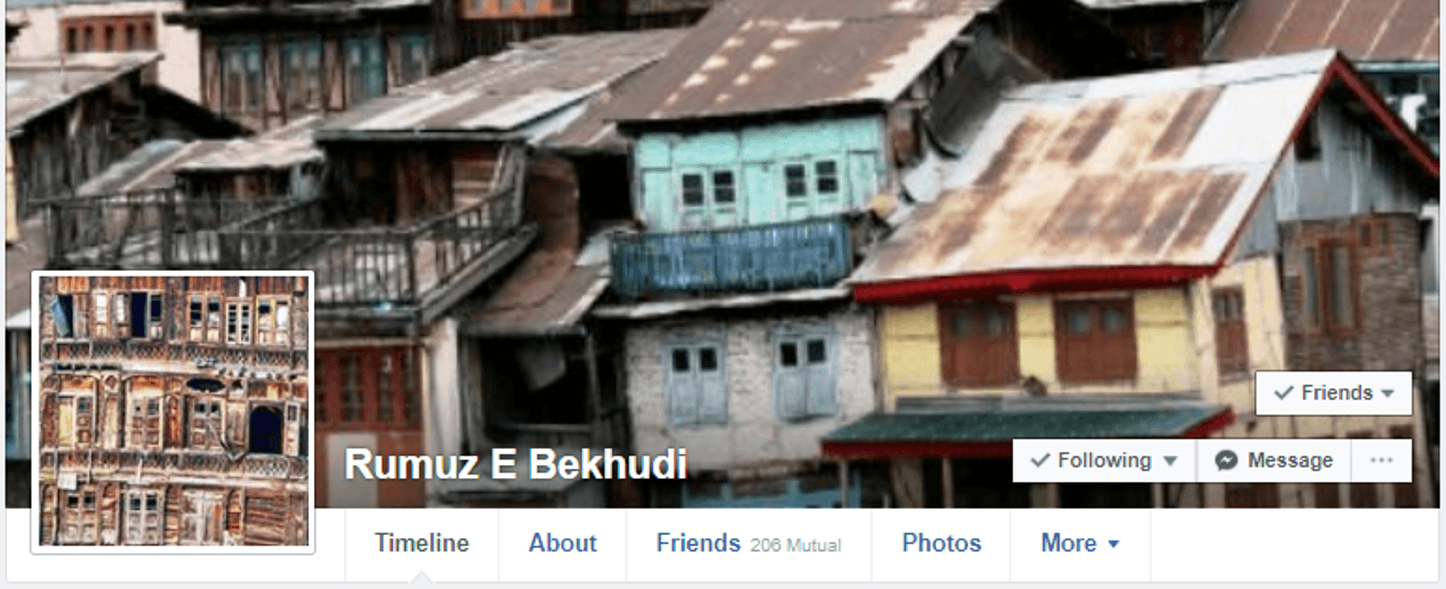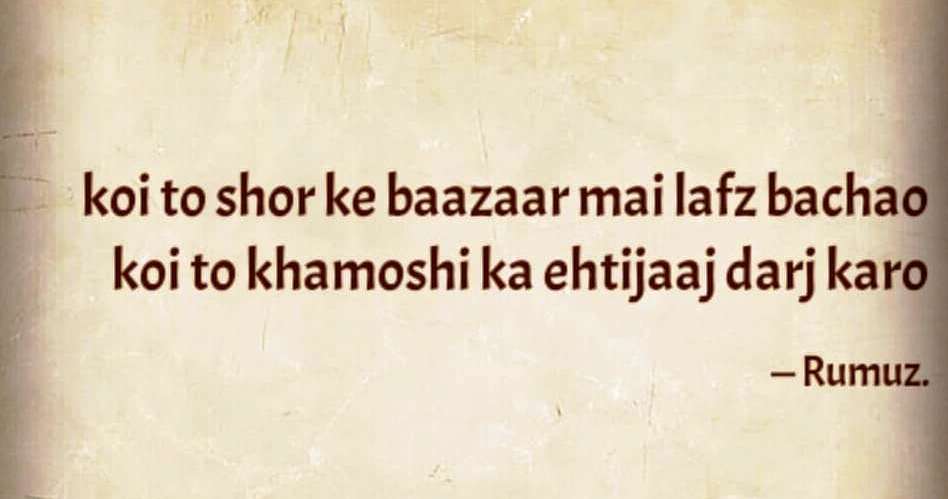Showcasing her multilingual poetic expertise on social media, rhymester Rumuz E Bekhudi has emerged as one of the promising poets from Kashmir whose weighty assonance has already created a virtual cult for her.
Her verses apparently bear the reflection of classical poetry—with which the poets of yore would uplift the mood of the Emperor’s court. But unlike the royal courtiers, this popular Kashmiri woman bard’s audience happens to be the smartphone-armoured generation, who scan and read her regular poetic posts on social media.
Maine socha tha,
Maine socha tha ki,
Hum donu
Ek hain
Lekin hum donu
Toa do nikle.
Ek tum
Doosre bhi tum hi;
Zarkhez ho tum,
Khud mai, khud se.
(I had thought,
I had thought that,
we two,
are one,
but we two,
turned out to be two;
one was you,
another was you too.
replete you are
in yourself, with yourself)
Every time, poet Rumuz E Bekhudi uploads her poems on Facebook, she leaves netizens—mainly her multiplying followers—wonderstruck. Much of that admiration comes from her polished poetic sense and execution, helping her construct stanzas in English, Kashmiri and Urdu.

As a multilingual poet, Rumuz has identified and understood the common thread that runs through poetry in different languages.
In Urdu, she seems to have created a unique sphere for herself, if not a niche already. One can tell how her poetry carries a sense and sensibility of a connoisseur. Unlike many of those naive verse-makers around who keep flooding their timelines with rhymes, Rumuz’s ability to delight the poetic aficionados, stands alone.
While she keeps posting her poetry to delight of her followers, hardly anybody seems to have a clue about her real identity.
In the crowd of couplet weavers, the young poet—using Rumuz E Bekhudi as her nom de plume—cloaks herself with anonymity.
She introduces herself as an engineer from Srinagar whose poetic journey began with the usual growing-up scribbling of personal thoughts and emotions. With time, her devotion and romance made poetry a larger canvas for her.
Her forte equally lies in translation. She translates others’ works in English with an artistic precision—that’s to say, her translations don’t seem to outrage the subtle flair and feeling of literature. She has already translated the works of some notable modern Kashmiri poets like Rehman Rahi’s “Thyen ros sadda” (soundless resonance) and Mahjoor’s “Greece koor” (Rural girl) from Kashmiri to English.
But as she loves to capture the rhythms of her homeland with her rhymes, poetry remains her mainstay.

Her Facebook page.
She veers her verses through the state of affairs and protracted conflict, before letting it delve into mysticism and romanticism.
By highlighting the contemporary issues through her verses, she is apparently making the case for her people.
Aajao, ki maine zakhmon ko sula rakha hai
Aa bhi jao, ki har malaal tera bhula rakha hai
(Come, I’ve put my wounds to rest,
Come, I’ve forgotten every whinge of yours.)
This might seem a usual sentimental lover’s address to his/her reluctant beloved, but many see the larger K-shades in these verses.
There’s a clear reflection of a half widow’s plight in the couplet, wherein, she seems to complain to her beloved—subjected to an enforced disappearance—that she continues to long and linger for him.
But whether her poems are a specimen of romanticism or rebellion, she rather leaves that judgement to her audience.
The other line of the Ghazal seems to underline the known predicament of Kashmir’s half widows, who keep campaigning for their disappeared beloveds every month.
Aajao, ki rang baatein karein aur baaton se khushboo aaye,
Aa bhi jao, ki agar tu aaye, yeh har suu aaye
(Come, let’s talk and lift this gloom,
Do come now, as your arrival will usher everything else).
Rumuz emphasises on the importance of ’empathy’ in poetry. As a poet, she says, one has to have a broad vision to paint a larger picture of the society.
There’s an evolutionary process, she says, through which every poet has to pass before coming to an age. “A poet starts from expressing his personal feelings and then graduates to learning the craft of giving a voice to collective emotions,” Rumuz says.
As a poet, she lets her work speak for her — and abhors the idea of being opinionated about everything under the sky.
Mere dil ki,
Siyah raaton mai,
Zakhm chamaktay hain,
Sitaaron ki tarah,
Kabhi jhurmut main,
Kabhi yaksaan yaksaan.
Aur pata hai?
Teri yaadon kaa,
Chaand ban chuka hai,
Jiski chaandni,
Har gosha-e-dil ka,
Wuzu bana kar,
Usse paak kardeti hai
Suno,
Aisa karte hain,
Is tamashay ko,
Misron se dhaanp lete hain,
Warna hum par,
Ibaadat ka,
Ilzaam lag jaayega!
(Loosely translated as: In the darkest phase of my heart, your wounds twinkle like stars… And do you know, your memory has become moon, whose moonshine awash and purifies each corner of my heart. Listen… Let’s shroud the scene with sentences. Otherwise, I’ll be blamed for worship).
That a woman can create a credible space for herself in the society without going shrill about it, is what makes Rumuz a poet with thinking cap.
Usse har gunah kartay waqt,
Yeh aawaaz aati thi,
Ki yeh gunah hai,
Bil aakhir, tang aakar,
Usne aise gunah ko,
Gunah samajh k kiya,
Aur sawaab ki neeyat karlee.
(While committing a sin / a voice would alarm him / that it’s sin / fed up, finally / he sinned a sin, like a sin / with intent of a virtue).
“The ripples created by a stone thrown into a lake,” Anantwarman, a poet from the pre-Islamic era in Kashmir, has defined poetry, “the ripples are still there even after the stone is long gone and drowned.”
Poetry, she says, should be on the similar lines.
“There’s a difference between commercial writers and creative writers,” she says. “I cannot produce poems on demand; it has to come out naturally.”
She emphasises that conventional sources of reading poetry, like through books, or from a mentor are always better than just depending on the information from the digital web world.
Young poets in Kashmir, she says, need to get rid of the monopoly of language as it’s important to draw inspirations from poets of multiple languages.
With her family’s support, her poetic journey is achieving fresh nuances day by day. And in the process, her expression—the poetic voice—is evolving to the wonder of her followers.
“Poetry should’ve a lasting impact on your mind—even when the poetry has been withdrawn from you,” Rumuz says. Her views are ably being complimented by one of her couplets:
Koi to shor ke bazaar mai lafz bachao,
Koi to khamoshi ka ehtijaaj darj karo.
(Let somebody bat for a word amid noise / Let someone register a protest by a silence).

Like this story? Producing quality journalism costs. Make a Donation & help keep our work going.








